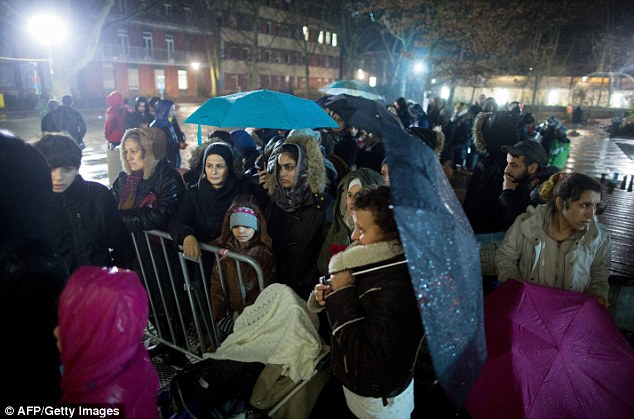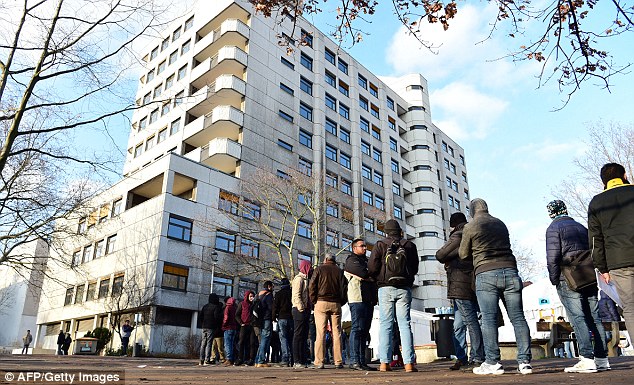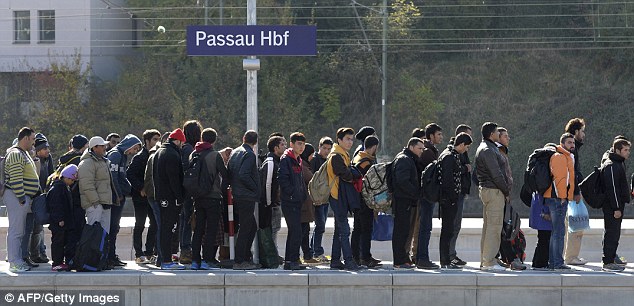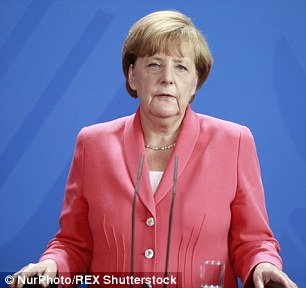On December 7, 2015, Germany, of all countries, announced its support for the EU labelling of products produced on disputed land sometimes referred to as Israeli "settlements." Apart from the fact that Palestinians openly consider the entire country of Israel -- "
from the River to the Sea" -- one big settlement, one can only marvel at what is now being imposed by the EU and, this week, by Germany.
Faced with the greatest crisis in its 22-year history -- an influx of millions of migrants from the Middle East, Africa, and Afghanistan -- the European Union spent much of November on its long-debated policy of the labelling of products from the disputed territories of the West Bank, the Golan Heights and East Jerusalem. On November 11, it demanded that exports (mainly fruit and vegetables) from these areas no longer be labelled "produced in Israel."
The four-page "
Interpretative Notice on indication of origin of goods from the territories occupied by Israel since June 1967", issued by the EU's executive body, the 28-member European Commission, makes assumptions about Israel and the territories that have already been challenged by Israeli officials. It begins with the following paragraph:
(1) The European Union, in line with international law, does not recognise Israel's sovereignty over the territories occupied by Israel since June 1967, namely the Golan Heights, the Gaza Strip and the West Bank, including East Jerusalem, and does not consider them to be part of Israel's territory, irrespective of their legal status under domestic Israeli law. The Union has made it clear that it will not recognise any changes to pre-1967 borders, other than those agreed by the parties to the Middle East Peace Process (MEPP)
If this is the basis for a discriminatory measure, it has little or no legal basis. The claim that their interpretation of Israeli rights in the territories mentioned is "in line with international law" raises the simple question: "which international law?"
Israel's occupation of the West Bank is fully legal under the terms of UN Resolution 242 (1967), which was carefully drafted to guarantee Israel's rights to remain there until such time as there is a "Termination of all claims or states of belligerency and respect for and acknowledgement of the sovereignty, territorial integrity and political independence of every State in the area and their right to live in peace within secure and recognized boundaries free from threats or acts of force."
As no secure and recognized boundaries have been established, despite numerous attempts by the government of Israel to bring them about, Israel's presence there remains entirely legal. And as only Israeli armed forces will be required to withdraw in the event that such boundaries are created, the presence of Israeli settlements there will remain legal under the terms of the original League of Nations Mandate for Palestine, which stipulates that there should be close Jewish settlement in all areas. Those Mandate provisions were incorporated into UN Resolution 181, which called for the establishment of a Jewish and an Arab state.
Similarly, the statement that the EU "will not recognise any changes to pre-1967 borders" is legally invalid as well as obnoxious. No such pre-1967 borders ever existed. The armistice lines, established in 1949 on the termination of the 1948-1949 war between Israel and its several Arab enemies, are not borders. And as the 1967 war was fought by Israel as a war of defence, its alleged "occupation" (which then included the Gaza Strip) of territories previously occupied by two of the belligerent states (Egypt in Gaza, and Jordan in the West Bank) is fully legal under the international laws of armed combat, principally under
Article 51 of the UN Charter.
When the EU's Interpretative Notice goes on to state that its aim "is also to ensure the respect of Union positions and commitments in conformity with international law on the non-recognition by the Union of Israel's sovereignty over the territories occupied by Israel since June 1967," it clearly does not recognize the validity of a major international agreement, UN Resolution 242, and it gives no proper explanation of what is meant by "sovereignty."
The many debates over the occupation, international law, sovereignty status and so forth need to be addressed in their own right. Suffice to say here that the EU's blanket declaration of its enforcement of international law is seriously open to question. And, it must be added, its inclusion of Gaza in the occupied territories takes no account of the fact that Israel withdrew completely from Gaza in 2005 and that no goods exported from Gaza have been labelled "produced in Israel" for over a decade.
The Israeli response to the EU decision was swift. Prime Minister Binyamin Netanyahu
commented:
"The EU decision is hypocritical and constitutes a double standard; it singles out Israel and not the 200 other conflicts around the world. The EU has decided to label only Israel, and we are not prepared to accept the fact that Europe is labeling the side that is being attacked by terrorism. The Israeli economy is strong and will withstand this; those who will be hurt will be those Palestinians who work in Israeli factories. The EU should be ashamed."
Netanyahu was backed by the leader of Israel's main opposition party, the Zionist Union, Isaac Herzog. He
said that he "strongly opposes this harmful and unnecessary measure." Herzog called the ruling "a prize that Europe is bestowing for terror," and adding that it "serves only one purpose -- continuing the hate and regional conflict. Marking these products is an act of violence by extremists who want to further inflame the situation and the EU is falling into their trap."
Israel's Ministry for Foreign Affairs expressed further support for the determination that the new legislation is discriminatory. It
pointed out the discriminatory nature of the decision: "It is puzzling and even irritating that the EU chooses to apply a double standard concerning Israel, while ignoring that there are over 200 other territorial disputes worldwide, including those occurring within the EU or on its doorstep. The claim that this is a technical matter is cynical and baseless."
Netanyahu and the Israeli Foreign Ministry are right. There are countless territorial disputes round the world. Ones that stand out are those in which a state illegally occupies or incorporates the territory of another people. After the Chinese invasion of Tibet in 1950, the country was incorporated into the People's Republic of China as an "Autonomous Region." When Spain and Mauritania withdrew from the Western Sahara in 1976 and 1979 respectively, Morocco annexed the area. It still occupies two-thirds of this vast (100,000 square miles) territory, despite the absence of any UN resolution recognizing its sovereignty there. Kashmir is controlled by no fewer than three countries -- India, Pakistan and China -- each of which holds a different part of the former princely state. This division has led to two wars between India and Pakistan, and remains hotly contested, without a formal international recognition of territorial rights. In 2014, Russia dispatched armed forces, started a war, and annexed Crimea, a territory that had been formally recognized as part of Ukraine. The UN General Assembly subsequently
issued a resolution that called on the international community not to recognize any change to the status of Crimea.
All of the above disputes involve territorial claims that are essentially illegal, yet the European Union has never demanded that China, Morocco, Russia, Pakistan or India label goods in ways like those demanded of Israel. There are no labels saying "Product of Tibet (produced by Han Chinese occupiers)", "Crimean produce under Russian occupation," or "Western Sahara phosphates (extracted by Moroccan settlers)."
It gets worse. The European Union was a joint signatory (with the US, the UK, China, France, Russia and Germany) to the
Joint Comprehensive Plan of Action, the notorious deal with the Islamic Republic of Iran that permits it to build nuclear weapons, despite its decades-long repeated violations of its commitments under the Non-Proliferation Treaty. In anticipation of the lifting of the sanctions against Iran, European diplomats and businessmen have been packing their bags and heading to Tehran to set up commercial deals that will allow the export of European products to Iran and the import of Iranian goods to Europe: a "Pistachio Deal." They are being
encouraged to do so by European governments, such as the UK
through its Trade and Investments wing. But Iran is the world's biggest terrorism-supporting state, and Tehran is still deeply engaged with fighting in Yemen, Iraq, Syria and Lebanon, while supporting Hamas in Gaza and manoeuvring to
increase its influence in the West Bank.
This seemingly innocuous move, taken for purportedly "technical reasons," clearly reveals the racist, anti-Semitic underpinnings still alive and well in members of the European Union. It singles out Israel for treatment not meted out to other, larger countries, even where their occupation and annexation has led, and still leads to, conflict, crime, terrorism, and even repeated threats of genocide. Such a singling-out reflects the many other ways in which countries, world bodies (such as the Organization of Islamic Cooperation, the Arab League, or the UN Human Rights Council) isolate Israel and hold it to arbitrary, fabricated standards not applied to any other country in the world.
The Boycott, Divestment, and Sanctions (BDS) Movement, of which this European labelling is a part, takes the issue of marking products even farther. It does not just involve itself only with capriciously directing commerce; it also tries to muscle academic, cultural, and scientific spheres. The EU directive on labelling is already being cheered as a justification of BDS policy. Ramallah-based Mahmoud Nawajaa, general coordinator for the
Palestinian BDS National Committee has
said labelling was a "sign that European governments are reacting to public opinion, civil society campaigning and Israeli intransigence and are becoming more willing to take some basic action against Israeli violations of international law." He did not, of course specify which laws were Israel was presumably violating.
Israel is not alone in rejecting the EU directive. On November 9, a bipartisan group of 36 U.S. Senators, led by Sen. Kirsten Gillibrand (D-NY) and Sen. Ted Cruz (R-Texas),
sent a letter to the EU's foreign policy czar, Federica Mogherini, to protest the EU's decision. They emphasized the potential of the directive to encourage and expand the boycott movement:
"As allies, elected representatives of the American people, and strong supporters of Israel, we urge you not to implement this labeling policy, which appears intended to discourage Europeans from purchasing these products and promote a de facto boycott of Israel, a key ally and the only true democracy in the Middle East... We are also deeply concerned that enacting this policy would lead to the broader boycott of Israel."
Similarly, a spokesman for Germany's ruling Social Democratic Party
declared that the decision to label settlement products was not a step to protect customers, but would instead create a "stigma" against Israel. He added that the ruling was a "mistake."
It is not just American senators who find the EU measure offensive. Several academic lawyers specializing in international law have addressed its contents, and have found them inaccurate, contradictory and lacking in justice. One such lawyer, Jonathan Turner of "UK Lawyers for Israel," wrote in a personal communication on November 11:
Note that the Notice claims at the same time that: It is important that products from the West Bank and "East Jerusalem" cannot be labelled "product of Israel" because (1) the EU (channeling the authority to speak on behalf of "international law") does not recognize these areas as part of Israel and (2) consumers might be confused and think that the areas are part of Israel.
It is okay for products from the West Bank, "East Jerusalem" and Gaza to be labelled "product of Palestine" because (1) even though the EU doesn't recognize a state of Palestine, that doesn't make a difference and (2) magically consumers will not be confused.
In October 2015, just weeks before the EU directive was issued, two international law professors wrote a 35-page summary of the legal issues involved in the process. Eugene Kontorovich, professor of international law at Northwestern University, and Avi Bell, Professor of Law at the University of San Diego School of Law and at Bar-Ilan University Faculty of Law,
published a paper titled "Challenging the EU's Illegal Restrictions on Israeli Products in the World Trade Organization". Among the points they make is that the EU labelling process is illegal according international law:
The EU's proposed measures restrict Israeli trade in violation of international trade law found in numerous multilateral treaties, including articles 2.1 and 2.2 of the World Trade Organization Agreement on Technical Barriers to Trade; Articles IX, X and XIII of the General Agreement on Trade and Tariffs and Article 2.3 and 5.6 of the Agreement on the Applications Sanitary and Phytosanitary Measures, among others.
The discriminatory nature of the legislation is made clear in a precise manner:
Any justifications the EU could adduce for its policies are undermined by their admittedly discriminatory application. The EU does not have a general set of rules for dealing with occupied territories, settlements or territorial administrations whose legality is not recognized by the EU. Rather, the EU has special restrictions aimed at Israel. This violates the fundamental rules of the GATT/WTO system, under which even otherwise valid trade restrictions are void if not applied uniformly to WTO members. Thus Israel's successful assertion of its rights in no way involves having the WTO accept its position on the status of the territories.
Finally, they add a caveat addressing the technical point that the territories are not part of Israel:
EU arguments that these territories are not part of Israel are irrelevant in this context. The scope of the WTO agreements explicitly extend beyond a country's sovereign territory, and include territories under its "international responsibility." The drafting history and subsequent application of the GATT make clear that this involves territories under military occupation
In a much shorter but
comprehensive piece written just after the EU announcement of its new policy, Avi Bell addresses some of the central issues. Like Jonathan Turner, he sees both contradiction and discrimination in the ruling:
The Notice says that when products from the Golan Heights, "East" Jerusalem, the West Bank and Gaza are sold in Europe, they must not be labeled as "products of Israel" because the EU believes that these areas are not sovereign parts of Israel under international law and, therefore, consumers would be misled if they were labeled "products of Israel." However, the Notice states that it would be lawful to label products from the West Bank and Gaza as "products of Palestine" (and maybe from "East" Jerusalem as well, though the Notice is ambiguous on this point) even though the EU does not recognize the sovereignty of a state of Palestine. This is because presumably European consumers only care that product labels reflect EU views of sovereignty under international law when this works to the disadvantage of Israel.
He also draws attention to a British legal precedent that contradicts the EU position:
The Notice claims that it is doing nothing more than providing guidance in response to "a demand for clarity from consumers, economic operators and national authorities." Yet, the Notice not only fails to cite any evidence of this alleged demand, it ignores a British Supreme Court decision that states quite explicitly that there is no such demand -- in the 2014 case of Richardson and another v. Director of Public Prosecutions, the Court ruled that "there was no basis for saying that the average consumer would be misled ... simply because [a product was] described as being [made in] Israel when actually it was [made in the West Bank]."
It is worth quoting further from this well-argued document. One of Bell's strongest points is made when he demolishes the EU's rights to establish international borders and its ability to legislate history:
The Notice presents its position on the borders between Israel and a future state of Palestine as those of "international law" as if the EU had the authority under international law to establish Israeli-Palestinian borders. In fact, not only does the EU lack this authority under international law, the EU is signed as a witness on Israeli-Palestinian peace agreements that state that the borders are to be established only by agreement between Israel and the Palestinians. Similarly, the Notice claims that the EU "will not recognise any changes to pre-1967 borders, other than those agreed by the parties to the Middle East Peace Process" even though there were no pre-1967 Israeli-Palestinian borders. In fact, by trying to establish the pre-1967 Israel-Jordan and Israel-Egypt armistice lines as the new Israeli-Palestinian borders, the EU is trying to force changes to the pre-1967 borders contrary to the agreement of the parties to the peace process. Ironically, the EU is trying to rewrite history as well, since there is no country in the EU that viewed the armistice lines as borders pre-1967.
In the face of so many emphatic legal red lights, it is clear is that the directive would not have been issued at all if there had not been a strong pre-existing EU bias against Israel, its government and its people. Sadly, Europe has clearly returned to its oldest racist hatred. The past decade and more has seen a marked recrudescence of not only the old anti-Semitism in European states, but also the new anti-Semitism -- one motivated by a hatred of the Jewish state of Israel. The duplicitous attempt at a distinction between the hatred of individual Jews and the hatred of the Jewish state is demonstrated in the many instances above of unequal application of the law. There are means available for Israel to fight this bigoted "Jim Crow" ruling.
[1]
In the 1930s, Jewish shops, businesses and goods were labelled with Jewish stars and the word "
Jude." Everyone thought that this style of crude anti-Semitism had vanished from our towns and cities. Yet today, sadly, the same racism has returned at the highest level of European government.
Denis MacEoin is a former editor of the Middle East Quarterly, a Distinguished Senior Fellow of the Gatestone Institute, and the author of numerous books and articles on the Middle East and Islam.
[1] Kontorovich and Bell's analysis provide important guidelines for how to tackle the problem through legal means:
- Israel must begin the process of preparing to assert its international trade rights in the WTO's dispute resolution system, a quasi-judicial forum with authority to overturn measures that violate these rules.
- This would then be followed by formal consultations with EU trade officials, a required "out-of court" step before invoking the WTO dispute resolution process.
- The process should be monitored at the ministerial level or by a special interministerial committee. It is important to note that even the beginning of formal consultations does not commit Israel to bringing a dispute to a panel, and even then the matter can be narrowed or settled at any time. The substantial majority of WTO disputes never result in a ruling, but are settled diplomatically. However, bringing a dispute provides for diplomatic leverage that would otherwise be absent.
- It is extremely likely that the EU would respond to Israeli moves towards the WTO with a vocal and forceful reaffirmation of its position. This is commonplace in WTO disputes. Israel must be prepared to not be intimidated by such protests. The likely consequence of a failed WTO approach will be no worse than a failed diplomatic one, and the chances of success are much higher.
- If other steps fail, Israel should vigorously pursue a challenge to the measures through the WTO's dispute resolution system. The WTO has the power to rule the EU measures illegal. Moreover, it can authorize various forms of retaliation and self-help by Israel.
 Germany officials have apparently ordered a cover-up of crimes committed by migrants to prevent causing public alarm, German newspaper Bild has claimed
Germany officials have apparently ordered a cover-up of crimes committed by migrants to prevent causing public alarm, German newspaper Bild has claimed Bild claim that migrants are being used as cheap drug traffickers and dealers as well as petty thieves but the extent of the crimes has been hushed up by police so as not fuel right-wing debate
Bild claim that migrants are being used as cheap drug traffickers and dealers as well as petty thieves but the extent of the crimes has been hushed up by police so as not fuel right-wing debate The shocking claim comes as Germany registered over one million migrants in 2015, five times last year’s total
The shocking claim comes as Germany registered over one million migrants in 2015, five times last year’s total Chancellor Angela Merkel’s popularity has waned as a result of her open-door policy
Chancellor Angela Merkel’s popularity has waned as a result of her open-door policy Germany officials have apparently ordered a cover-up of crimes committed by migrants to prevent causing public alarm, German newspaper Bild has claimed
Germany officials have apparently ordered a cover-up of crimes committed by migrants to prevent causing public alarm, German newspaper Bild has claimed Bild claim that migrants are being used as cheap drug traffickers and dealers as well as petty thieves but the extent of the crimes has been hushed up by police so as not fuel right-wing debate
Bild claim that migrants are being used as cheap drug traffickers and dealers as well as petty thieves but the extent of the crimes has been hushed up by police so as not fuel right-wing debate The shocking claim comes as Germany registered over one million migrants in 2015, five times last year’s total
The shocking claim comes as Germany registered over one million migrants in 2015, five times last year’s total Chancellor Angela Merkel’s popularity has waned as a result of her open-door policy
Chancellor Angela Merkel’s popularity has waned as a result of her open-door policy


